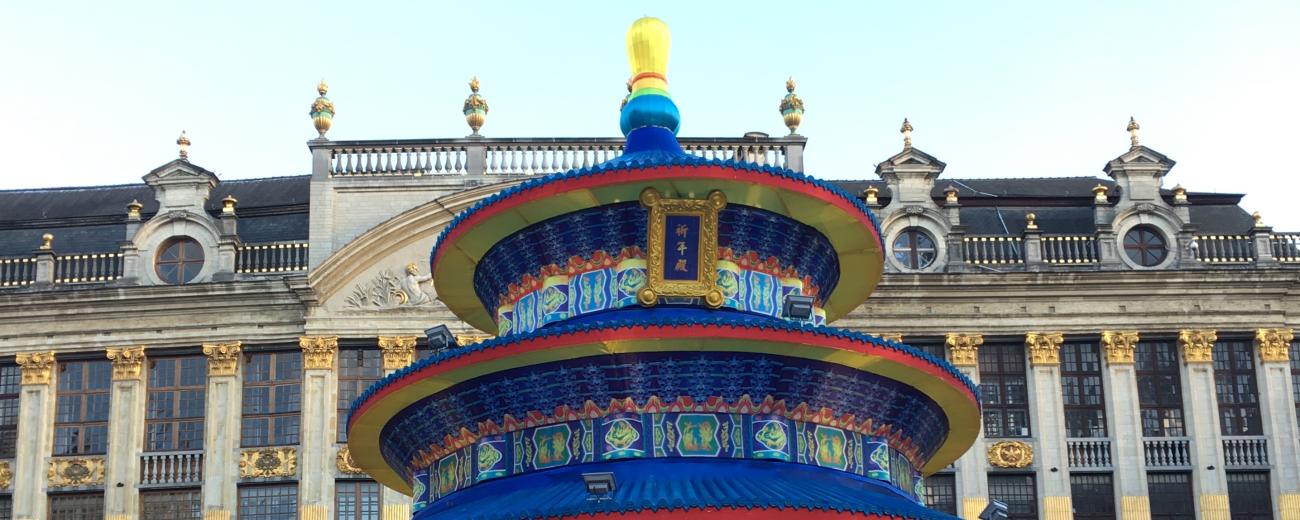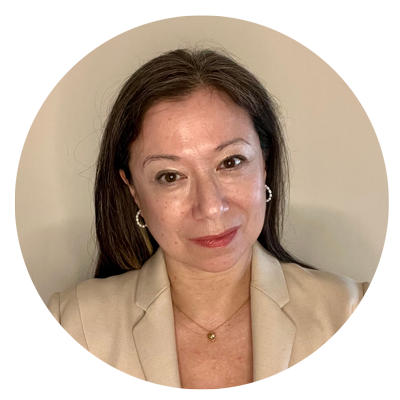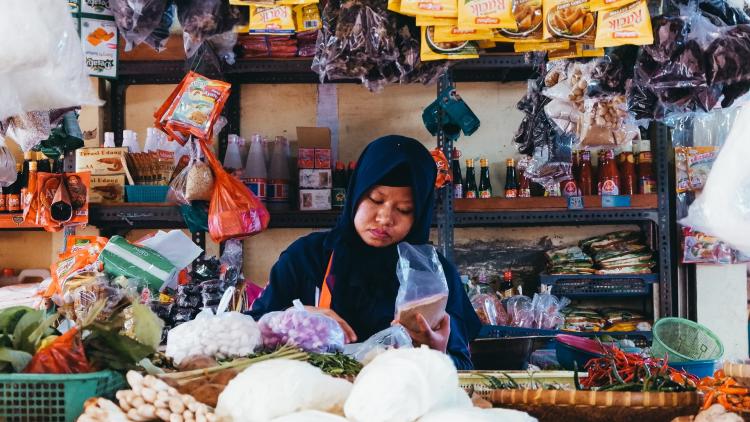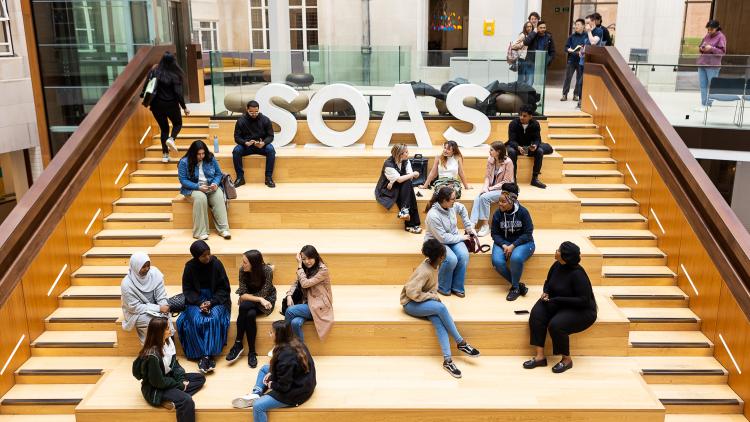Careers: At SOAS I felt I didn't have to explain myself


Samantha Mitchell studied Law and Economics at SOAS, graduating in 1991. Whilst studying at SOAS helped her carve a career as a Technology Lawyer and External Affairs Consultant, it's also the place where she felt that she didn't have to explain herself and a place where she made lifelong friends.
Could you tell us a little bit about yourself?
I am a UK qualified Lawyer and External Affairs Consultant, and have worked at the forefront of the City of London and Westminster, Europe and international politics for the past 20+ years.
Could you give us a brief overview of your current role and what you do on a day-to-day basis?
Sure, I'm a Technology Lawyer and External Affairs Consultant, which is slightly left-field given that my focus is more on the forward look (e.g. thought leadership) behind political and law-making landscapes, and I don't generally get involved in pure legal case work. Essentially, I am involved in a lot of horizon scanning, working to influence political agendas and being proactive in identifying market defining issues, or the 'tipping points' about to come down the track so that organisations are well-placed to escalate any issues, mostly contentious, to key external audiences. This includes building trusted relationships, running integrated campaigns and/or crafting narratives used to influence a very diverse range of political and other stakeholders. In short, I guess I'd be best described as a lobbyist and campaigner; although I should caveat that it is in nowhere near as dramatic as the political shenanigans we see ‘In The Thick of it’ or ‘The West Wing’ but, the principles are the same.
What motivates you in your role?
I pretty much started my working career in court advocacy and managing European Union (EU) projects and programmes for sustainable development, which I guess is something that has remained with me. Since I have a primary vested interest in global political economy, finance and innovative technology, this is pretty much the lens through which I continue to view my work.
Why did you choose to study Law and Economics?
My mother is Chinese and I am Chinese Eurasian. Being able to attend a unique institution like SOAS was therefore a revelation in learning more about my Chinese cultural heritage. I remember always feeling a bit ‘other’ while at school, particularly since we ate a lot of different foods (with chopsticks, shock horror!) and owing to the rituals performed by my mum. My mum was Buddhist but I attended a Catholic Diocesan school in rural Warwickshire. I remember once showcasing a food diary for a school project and was perplexed to discover that rice, fried sheep brains and pigs feet, washed down with lashings of hot tea, were not something eaten by my peers, yet it felt pretty normal to me.
When I arrived at SOAS, there was so much that felt familiar or homely. You notice the cultural differences straightaway, at least in my experience, because SOAS students are predominantly drawn from schools internationally, I immediately became one of the majority; albeit, because of my being mixed race, still a minority.
Studying Law, however, gave me an accepted and recognised route into a professional qualification, while reading Economics gave me a basis for understanding how political ideologies - such as Mao's Communist China - are in shaping the beliefs, characters and everyday lives of people. My mum left China during the political turbulence and aftermath of war and the Cultural Revolution, but there was little on-going news or information available given China's isolation. My mum often remarked that she felt ‘at a loss’ about what was still going on, and I think it’s important to continue to highlight this ‘data vacuum’, since being of two distinctly different cultures, you often find yourself being pulled in diametrically opposed directions. It is important to be able to gain a deeper understanding of the ‘why’.
How do you feel that your studies at SOAS helped to prepare you for your current role?
SOAS is brilliant at challenging you to think beyond the Western historical narrative, giving you exposure to the rapidly growing and burgeoning economies in the Far East and Africa. These have an array of very diverse cultures and legal systems. In the West, we often make the mistake of lumping all of the developing economies together as one homogenous trading bloc. But, in my professional career, and working across financial services, in particular, I've had to give a lot of strategic thought to what is now the popularly coined phrase BRICs (Brazil, Russia, India and China) which, more than a decade ago marked a defining moment in the pivot to the East, and a fight for global economic influence. We now, of course, are bearing witness and living through this very phenomena, accelerated more recently, by technology and showing the enviable ability of today's developing economies to 'leap frog' toward, and adopt the most advanced data systems, transport and infrastructure.
What did you enjoy the most about studying at SOAS? Do you have a favourite memory?
Without a doubt what I enjoyed the most about SOAS was the cultural mix. That sense of feeling like I didn't have to explain myself, that all cultures are valued and equal or worth knowing more about, and are not some idle curiosity to be put under a microscope. It's a place where you show a genuine and well-intentioned interest in who I am, my cultural history and my outlook. I guess, you describe this as a sense of feeling safe. What SOAS gave me was a safe haven.
Favourite memory is a difficult one, as I have so many fond memories. Two that particularly stand out for me are: firstly, just sitting in one of the ground floor window seats, the sun streaming through the window, reading none other than Yash Ghai's 'Political Economy of Law', when three (of my now best) friends walked by talking in their newly learned Mandarin. I later bumped into them in the infamous SOAS bar, and I still see, and hang out with them and others, more than 30+ years later. Secondly, dinners at the inner sanctum of the Middle Temple where I was invited to attend my first Indian wedding. Not only was this a very special and joyous occasion, but also one set against the venerable backdrop of centuries of English legal history, with all its 'pomp', oak panelling and vaulted beamed ceilings. It was an occasion very much where East met West, and quite rare for the time.
What advice would you give to someone looking to get into your field of work?
I had a number of interviews with law firms post-university, before deciding to carve out a career lobbying (firstly, in Europe), where it became clear to me that I enjoyed working more as an advocate on diverse issues when negotiating and drafting legal texts or contracts. The legal profession, as are other sectors, is of course changing. Digitalisation 3.0 and digital tools are starting to make the learning and writing side of things so much easier, while, advances in Artificial Intelligence, such as OpenAI’s recently launched ChatGPT, will no doubt make things easier still. But, without wanting to sound like a broken record, if you do what you're interested in, what you feel passionate about and aren't afraid to move sideways, opportunities will often present themselves when you least expect it. That's especially true in politics. In other words, it's important to keep stepping out of your comfort zone and to put yourself out there.
What one piece of careers advice do you wish you'd had when you were at university?
You don't know what you don't know, and it'll take a long time learning the tools of your trade before you really know anything at all! So, do make the time to seek out and listen to others, and to cogitate before committing to any plan of action. Reflection is as much a part of action as acting on reflex.
You'll also know the people you meet when you're younger for the longest time in your working career, so it's important to network and surround yourself with good mentors and people who want to support you. Sure, work is a competitive environment, and we're all hungry to climb the greasy pole but, if recent technology advances and data-driven initiatives teach us anything, it's that collaborative thought or knowledge-sharing propels us all on - it is this which enables us to be greater than the sum of our parts and good collaboration, after all, is all about teamwork.



